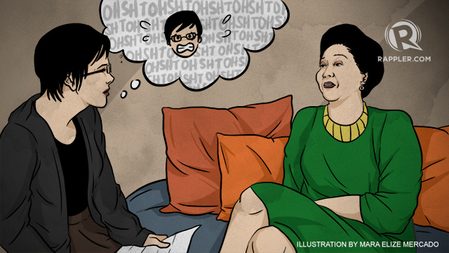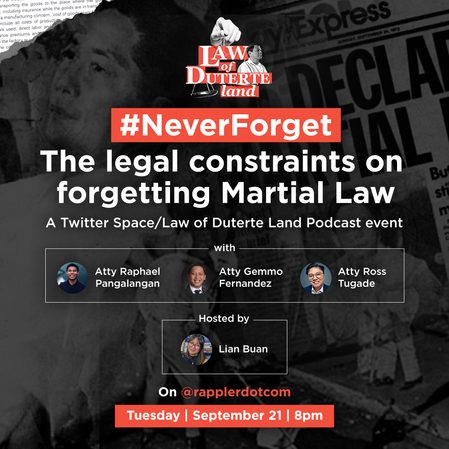SUMMARY
This is AI generated summarization, which may have errors. For context, always refer to the full article.
![[OPINION] Martial Law: A conflict of narratives](https://www.rappler.com/tachyon/2022/02/conflict-narrative-february-23-2022.jpg)
Thirty-six years after we hounded out of office the most powerful president we have ever known, we are seeing the rise of a big lie being circulated especially among our young: the Marcos era was the best of times. Marcos Jr.‘s spin masters seem to have learned well the oft-quoted remark of Joseph Goebbels, Adolf Hitler’s propaganda minister: if you repeat a lie often enough, especially a big lie, sooner or later people believe it.
Aiding this subliminal subversion of the truth is a confluence of factors that taken together may have contributed to the erosion of memory over this dark period in our history.
One was the failure to make the Marcoses and their cronies accountable for their human rights crimes and the wholesale robbery of the nation’s coffers. South Africa immediately installed a Truth and Reconciliation Commission to cut through the moral complexities of assigning blame and assuage racial bitterness caused by apartheid. Very early, they understood that reconciliation can only take place when the truth is out and there is an acknowledgment of wrongdoing and justice is done. There has to be clarity and a consensus among both victim and victimizer of what actually happened.
Unfortunately, to this day we have yet to grapple with the sordidness of this part of our history and jail those already found guilty. Onlookers are baffled by our inability to hold accountable the powerful. As the Singaporean statesman Lee Kwan Yew once remarked: “It is a soft, forgiving culture. Only in the Philippines could a leader like Ferdinand Marcos, who pillaged his country for over 20 years, still be considered for a national burial. Insignificant amounts of the loot have been recovered, yet his wife and children were allowed to return and engage in politics.”
Another reason is that the Duterte regime has succeeded in tarring those who criticize his governance as merely “dilawan,” a labeling that conveniently fends off rightful criticism and shuts off rational debate. By color-coding dissent and habitually consigning this to the dustbin of partisan politics, the overall effect has been the use of the word as an opprobrium and the consequent downplaying of what transpired in EDSA as a trivial blip in our political history.
The third, and most obvious reason for the rising belief in the Marcos myth is the failure to educate the young generation on the atrocities of this period. I asked a millennial who spent ten years of his schooling in his native province of Camarines Sur what he was actually taught. He replied that there was only a page or so in their textbook about the Martial Law period, and the teacher spoke glowingly of that era.
This lack of accurate historical memory among the young has been laid at the door of my generation. I have been asked why, in the first place, we failed to do intentional story-telling as witnesses.
My answer to this crystallized when I myself was asked by a group of young Playback theater artists to tell my own story. Unlike the stories of my contemporaries, I did not think that my own story was worth telling. I did not get clapped to jail and tortured. Nor was I forced to flee the country and migrate. But after telling the tale of how, fresh from university, the Manila Chronicle where I was starting out as a journalist was shut down, it dawned on me that Martial Law was in fact traumatic even for those of us who were merely swept to the sidelines. I suddenly found myself out of a job. I spent the first three months of Martial Law visiting my editor and activist friends in jail. I did not feel it right to join the Daily Express, then the only newspaper that was not shut down because it was owned by a Marcos crony. So to survive I shifted to the more innocuous job of speechwriting for cabinet ministers until I finally found work that I sensed to be my long-term calling.
The reticence, I realized, was because many of us buried in our collective unconscious the hidden trauma of disillusionment, seeing our ideologies fail, our dreams for the country fade, our friends tortured and killed, our careers derailed or lost in the hollow opulence of the land of the lotus that is America. Those who bore the brunt of the Marcos reign of terror are only now able to speak out of a long silence caused by the lacerations of that memory.
It is not true that iron rule came down hard only on a handful of insurgents. Our generation was decimated of some of its best and brightest, or sidelined from the usual paths to power, working in obscurity in pursuit of thwarted hopes for those in the margins. Even now, the whole country reels from the lingering effects of authoritarianism – the deterioration of our party system, the quality of our leadership, and the consequent collapse of what makes for real democracy in our institutions.
Marcos Jr.’s candidacy has raised fears of their cabal’s return to power. Providentially, it has also released a floodgate of narratives that may yet counter decisively the illusions sown and overturn his lead. A survey shows that more than half of registered voters are in ages 18-34, those most susceptible to the historical lies being peddled in media. But the same survey also says that family is a compelling determinant of the choices of 56% of our young people.
Communication theory tells us that messaging flows in two steps: media creates the desired social climate, but it is relational trust in family and friends that shapes decision-making and actual behavior. It is time parents and other keepers of memory sit down their children and tell stories of that long, dark night when the evil dragon swallowed the sun, so to speak. – Rappler.com
Melba Padilla Maggay is President of the Institute for Studies in Asian Church and Culture.
Add a comment
How does this make you feel?


![[OPINION] Stop Calling Him BBM!](https://www.rappler.com/tachyon/2022/02/tl-dont-call-him-bbm.png?fit=449%2C449)



![[Bodymind] Forgiveness, Enrile, and Bongbong Marcos Jr.](https://www.rappler.com/tachyon/2024/03/forgiveness-enrile-bongbong-march-6-2024.jpg?resize=257%2C257&crop=411px%2C0px%2C1080px%2C1080px)
![[Vantage Point] Father and daughter caught in a vise of geopolitics](https://www.rappler.com/tachyon/2024/03/tl-father-daughter-geopolitics.jpg?resize=257%2C257&crop_strategy=attention)
There are no comments yet. Add your comment to start the conversation.